Canadian Detective Found Guilty of Investigating Infant Deaths Linked to mRNA Vaccines
This case was never about misconduct. It was about silencing questions no one in power wanted asked.
Detective Helen Grus asked a forbidden question at the height of the pandemic: were COVID-19 mRNA vaccines connected to a spike in infant deaths? For daring to ask, she was dragged through the longest and most expensive internal disciplinary trial in Canadian police history. It has lasted 29 months, with 14 witnesses, 13 motions, and more than $1 million in taxpayer money.
According to the Ottawa Citizen: Grus allegedly accessed case files of Canadian newborn and infant death investigations to which she wasn't assigned and inquired with the coroner about whether the parents of babies who had died unexpectedly during the pandemic were vaccinated against COVID-19.
Investigators also alleged Grus contacted the father of a deceased baby directly on Jan. 30, 2022, to inquire about the mother’s COVID-19 vaccination status.
I first reported on this case nearly three years ago:
The response was overwhelming: readers rallied to raise $16,000 to support Grus’ legal fight:
I wasn’t able to attend her ongoing police tribunal myself, and recording were banned, so I am largely relying on the reporting of others who attended in person, including: Donald Best (Former Sergeant — Toronto Police), Vincent Gircys (Former forensic investigator — Ontario Provincial Police), Rob Stocki (Former Sergeant – Ottawa Police), Tamara Ugolini (Rebel News), Jason Unrau (Freelance journalist).
‘‘I was there for the trial. It was a complete setup. The hearing officer, Superintendent Chris Renwick (retired), refused to allow her expert witnesses, excluded Detective Grus own evidence, muzzled her testimony, imposed grossly unfair legal burdens such as requiring that the defense submit cross-ex question in writing in advance, and other grossly prejudicial requirements that served to decimate Detective Grus opportunity to provide a full and answerable defense. The verdict was predetermined before the trial began. The case was a kangaroo court, seven ring circus, clownshow all-in-one. At one point, after being called out by the defense, the hearing officer admitted he had to stop objecting on behalf of the prosecution. You can't make this stuff up.’’
— Rob Stocki, Former Sergeant – Ottawa Police
For Grus personally, the ordeal has drained an estimated $400,000 in legal fees. Grus’ union, the Ottawa Police Association, declined to provide any financial support to mount her defense, diverging from previous practice of offering police legal aid, even for those accused of violent criminal offences.
You can donate to her legal defense fund here:
A federally registered non-profit corporation was recently established in her name to ‘‘restore the Rule of Law and ensure that police investigations in Canada remain free from political control.’’
Grus Fights Back: $875K Lawsuit Against CBC
On March 28, 2022, although Grus's suspension was not yet public knowledge, CBC Ottawa published a story sourced from anonymous leaks within the Ottawa police, initiating a trial by media.
Detective Grus is now striking back against the media machine that helped orchestrate her downfall, suing the CBC for $875k for ‘‘Publishing Harmful, Malicious & Harassing Articles Containing False Statements’’:
Specifically, Detective Grus alleges that CBC’s articles dated March 28th and 31st, 2022, were based on confidential information from unnamed sources within Ottawa Police Service and directly precipitated the administrative charge against her.
…
Essentially, Detective Grus believes that the CBC libeled her intentionally, while she was trying to receive a fair and impartial hearing. Their published articles were timed perfectly to have the greatest negative effect on her reputation and her case outcome.
A CBC reporter is also personally named as a defendant in the lawsuit.
That CBC reporter argues that Grus victimized the parents of the deceased infants, and thus her own reporting was righteous.
“I have no doubt that sources were motivated to speak about this because it’s, you know, to their mind, a further victimization of who are innocent people who are having the worst time in their lives, that it strikes really at the heart of what police are supposed to do.”
— CBC reporter
I contend the opposite: that parents would be *grateful* to know why their babies died.
"I don’t want more babies to die. Whether it’s vaccine-related or not, I want to try to find out why these little babies died... I’m not okay with babies dying and not getting any answers.”
— Detective Helen Grus
This CBC defamation lawsuit will likely drag on for years.
Ottawa Tribunal Finds Grus Guilty
In March 2025, the Ottawa Police tribunal delivered its verdict: Detective Helen Grus was found guilty of “Discreditable Conduct”—a vague, all-purpose charge trotted out when no actual crime or statutory violation can be proven.
Full decision available here:
A Political Conviction, Not a Legal One
The ruling makes clear that Grus was not punished for misconduct but for daring to investigate why infant deaths were doubling or tripling during the pandemic. The tribunal’s reasoning faults her for failing to seek “permission” before probing these infant deaths and emphasizing the “political and societal ramifications” of her inquiries, i.e., politics, not law, determined this outcome.
What She Actually Did
The supposed “misconduct” boiled down to one thing: asking too many questions. Grus accessed files for nine infant death cases and, in one instance, ‘‘phoned the father of a deceased baby’’ to ‘‘ask whether the mother had been vaccinated against COVID-19.’’
That single call became the foundation of the charge. The tribunal speculated that this phonecall might have caused distress. But the father never complained, no evidence of harm was presented, and the question was directly relevant to the investigation.
Grus was not accused of falsifying data, leaking information, compromising an investigation, or unlawfully accessing files—the Professional Standards Unit had already cleared her on those points. Her “offense” was simply investigating deaths that weren’t formally assigned to her, despite that being her very job.
A Rigged Tribunal
The hearing officer (not a judge, simply a retired police officer with no formal legal training), Superintendent Chris Renwick, made no pretense of neutrality. From the start, he announced that any evidence “outside the scope” of the misconduct charge would be disregarded. That allowed him to bar testimony about the spike in infant deaths, dismiss Pfizer’s own trial data as irrelevant, and block medical experts from appearing:
Dr. Gregory Chan, a family physician, submitted written testimony highlighting the lack of safety data and noting a patient’s stillbirth two months after vaccination. He was blocked from appearing in person.
Dr. Eric Payne, a pediatric neurologist, submitted a statement emphasizing the absence of reliable safety data. He too was blocked.
Renwick’s final written decision, dripped with sarcasm, accused Grus of “weaponizing” her position, and framed her concerns as nothing more than opposition to the Ottawa Police vaccine mandate, and heavily implied that she didn’t actually care about dead babies.
Helen Grus' legal counsel, Bath-Sheba van den Berg, argues that Renwick’s guilty verdict:
Sets a precedent that police cannot investigate matters implicating public officials
Suggests officers must seek executive permission to pursue sensitive inquiries
Undermines the principle that police discretion is essential to justice and public safety
Signals that public officials are above the law, and officers who challenge this are punished
Bath-Sheba van den Berg explains:
‘‘When Helen was testifying and I was asking her the question of how many babies had died in the clinical trials, again, the clinical trials of the Pfizer vaccine did not test pregnant and breastfeeding women, but they did collect some data. So I was asking her the question, how many babies died? And the hearing officer, so Helen's sitting on a chair with wheels, and to her right is a hearing officer. He lurches forward towards her with his hand like this and tells her to stop. He tells her to stop testifying, right when she's giving the answer of how many babies died, because all of them bar one died. And he didn't want that on the record. It did end up going on the record that he tried to stop her from her examination, from my examination, from her defense. The hearing officer stopped the person who's accused here, Detective Helen Grus, from testifying to how many babies died.’’
Rebel News reporter Tamala Ugolini attended the tribunal and made this video about the cover-up:
This Case Sparks Police Procedure Reform
Under Ontario Regulation 395/23, made pursuant to the Ontario Community Safety and Policing Act and proclaimed on April 1, 2024, police officers are now required to obtain supervisory approval before initiating a criminal investigation.
This new law is unprecedented. How can probable cause ever be established if officers are forbidden from even beginning a cursory investigation?
Since the founding of Canada, officers have had the autonomy to begin questioning or investigating suspected crimes without first asking permission. The new “duty to notify a supervisor” represents a historic break from nearly two centuries of police independence. Officers are now effectively barred from investigating public officials without prior authorization. This is corruption in plain sight. It gives political gatekeepers the power to block investigations that might inconvenience their allies or “offend their supporters.”
Here is the biggest problem, however: this rule only came into effect on April 1, 2024... So how can Detective Grus be prosecuted under a requirement that did not even exist at the time of her actions?
Clearly, it is a rule invented retroactively to justify her crucifixion.
Punishment
Two weeks ago, the kangaroo tribunal convened to decide Grus’ punishment. The prosecution pushed for a two-year demotion, from 1st class to 2nd class constable — a penalty worth roughly $100,000 in lost wages (for comparison, even a drunk-driving conviction results in only a six-month demotion) — on top of the $400,000 she has already spent on legal costs.
At the sentencing hearing, Grus’ lawyer filed thousands of pages of affidavits and exhibits. One affidavit cited internal government records showing that, as early as July 2021, Manitoba officials had raised concerns about a rise in spontaneous abortions following the administration of these drugs to pregnant and breastfeeding women.
The thrust of these submissions was clear: a cover-up is underway.
"There shouldn't even be a charge of discreditable conduct. There shouldn't be a penalty…the tribunal is trying to conceal evidence of criminal negligence.”
– Helen Grus' legal counsel Bath-Sheba van den Berg
The key takeaway now is this: the Chief of Ottawa Police Service was handed sufficient documentation in the affidavits, including Health Canada and Public Health Agency of Canada own concerns, as flags were being triggered while the "safe and effective " narrative continued. Does he acknowledge she was correct all along and that he was criminally negligent, or does he ignore all the submitted data and become complicit in the crime?
The tribunal has now adjourned to give the prosecution two months to review the thousands of pages of testimony alleging a cover-up. Grus’ first appeal can only go to a higher provincial policing tribunal — and only after that to a real court, with a real judge. The added legal costs of these expected appeals are expected to reach an additional $200,000.
Clearly, the process is the punishment.
The Grus case is not just about one detective or one phone call. It sets the precedent that politically inconvenient investigations can be shut down, and the officers who pursue them can be bankrupted and destroyed. At stake is something much larger: whether Canadian police still have the independence to follow evidence wherever it leads, or whether politics now decides which deaths are worthy of answers.
Detective Helen Grus is, in my view, one of Canada’s bravest living heroes. For asking a question no one in power wanted answered, she was bankrupted, smeared, and dragged through a sham tribunal. Yet she still stands tall.
This summer, at a packed Ottawa church, she was greeted not as a disgraced officer, but as a hero, receiving a standing ovation from a grateful crowd.
No one will remember the politicians and bureaucrats who smeared her. Their names will fade. History will remember the woman who stood alone and dared to ask why babies were dying.
Don’t know about the Helen Grus case? That’s because the legacy media refuses to cover it. If you value real journalism that holds power to account, share this article and subscribe to support independent media.




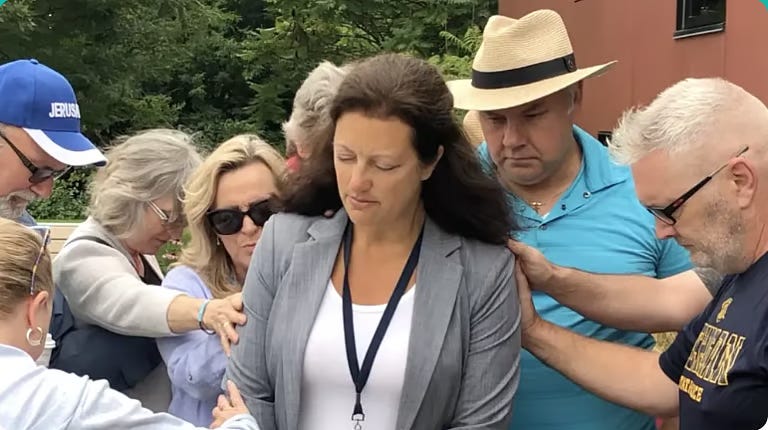


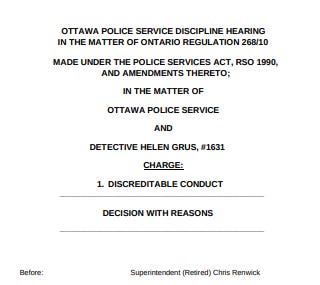
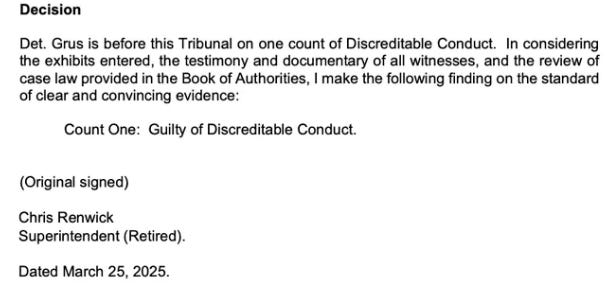

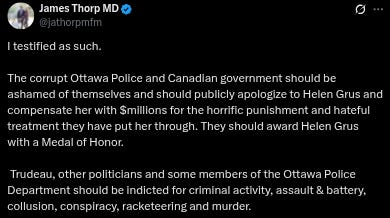

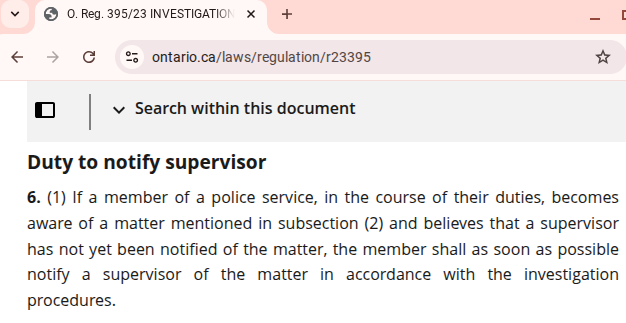

Time to liberate Canada from tyranny. It's not safe to have that kind of government north of the border.
The process is the punishment was as I understood, a fictional articulation of institutional structure, from a terrifying book called The Trial.
Now it's part of Canadian everyday lifem